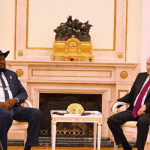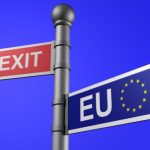Irish Prime Minister Enda Kenny reiterated Dublin’s call for the Brexit treaty between the EU and Britain to spell out that Northern Ireland would join the European Union again immediately if it chooses in a referendum to unite with Ireland under the provisions of the 1998 peace agreement as he was meeting EU officials in Brussels on Thursday (February 23).
That, he said, would follow the example of the EU’s absorption of East Germany on reunification in 1990.
“The president is very much well-acquainted with the Good Friday agreement, and he’s already said that we don’t want to see the Good Friday agreement damaged in any way. That’s a real priority for us, given that Europe supports the peace process very strongly. The language of the Good Friday Agreement speaks for itself. It provides that opportunity that you’ve mentioned in respect of the situation that arose after the Berlin Wall was taken down and that East Germany was able to join West Germany in a seamless fashion. So that’s already inherent to the Good Friday Agreement so therefore in protecting that and being able to implement it, we want that language incorporated into the agreement that will eventually emerge,” Kenny said after a meeting with EU Commission President Jean-Claude Juncker.
With an economy highly dependent on trade with Britain, and the only land border with the UK, Ireland is widely considered the country with the most to lose when its bigger neighbour quits the European Union.
Kenny met Juncker and EU Brexit negotiator Michel Barnier in Brussels, where he stressed Dublin’s concerns about keeping its border with the British province “as open as possible” once it becomes the EU’s only land frontier with Britain – in part to avoid risking a return to sectarian conflict in Northern Ireland.
“This is a political challenge. The British government and the Irish government agreed that there will be no return to the borders of the past or the hard border. That means customs pushed along where the border is for the moment, which is invisible if you go to look for it. But obviously until the British government clarify their position insofar as customs union membership or associate membership is concerned. That has a direct impact on trade, so for us, the best outcome here would be to have a situation that is as close to what we have for the moment for the future,” Kenny said.
Kenny noted that until British Prime Minister Theresa May launches the Brexit process by detailing Britain’s demands, something she aims to do next month, Ireland and its EU allies could not know where border negotiations would start.
Kenny – who has already said he will not lead the party into an election due as early as next year – has faced growing calls to clearly spell out his plans as support for the party slumped amid the government’s mishandling of a policing scandal. And this week the European Commission had to deny reports saying that Juncker would resign before the end of his term at the head of the EU executive arm.
Asked during the news conference which one of the two leaders would resign first, Juncker replied to the Euronews journalist: “You”.
Juncker has said he will stay in office until the end of his current term, which expires in 2019.
Kenny, prime minister since 2011, leads a minority government that has become increasingly unstable and only narrowly survived a vote of no-confidence last week over its handling of a policing scandal.











